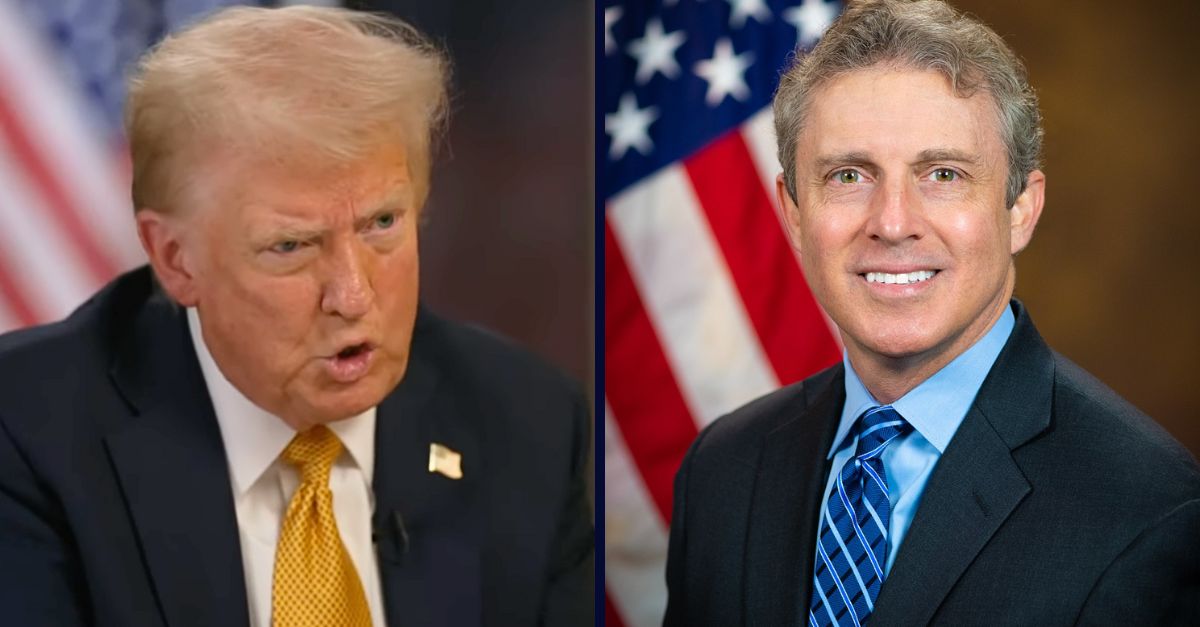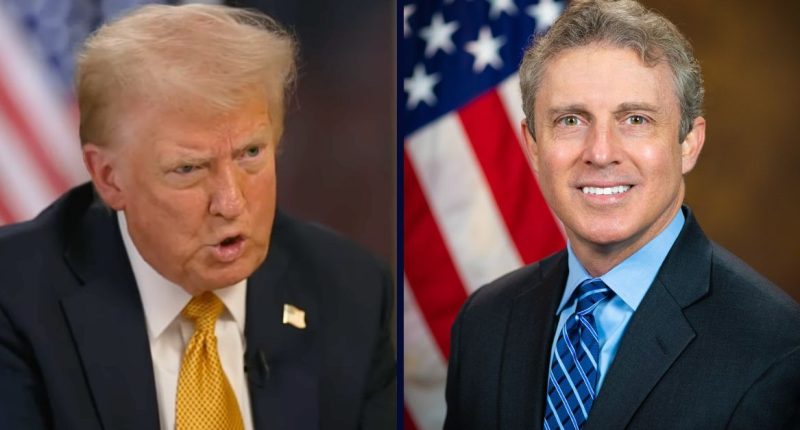
Left: President-elect Donald Trump on “Meet the Press” Sunday, Dec. 8, 2024 (NBC News/YouTube). Right: Hampton Dellinger (Office of Special Counsel).
President Donald Trump‘s Justice Department has been advocating for restrictions on judicial authority in the Hampton Dellinger firing case — which has seen the Biden ethics enforcer battling in court to keep his job at the Office of Special Counsel — that “contravene nearly a century of precedent” and “defy” years of historical practice, the embattled watchdog says in a new filing.
Dellinger, who was appointed by Joe Biden in 2024 to lead the OSC and enforce whistleblower laws, sued the Trump administration on Feb. 10 in the District of Columbia after being axed by Trump “in a one-sentence email” in January, according to his federal complaint. U.S. District Judge Amy Berman Jackson ruled last Saturday that Dellinger’s termination was illegal and unprecedented. She ruled in favor of letting Dellinger stay on board after listening to arguments from both sides at multiple hearings over the past month related to a temporary restraining order that Jackson granted on Feb. 12 to let Dellinger keep working while she heard the case.
That same day, Trump’s DOJ filed emergency motions to stay Jackson’s ruling in district court and the U.S. Court of Appeals for the D.C. Circuit, which ordered Dellinger to respond by Wednesday. The ethics watchdog laid out his case in an opposition filing and letter to the appellate court, insisting that the DOJ’s argument “lacks merit” and is a slap in the face to legal precedent.
“These rulings were correct,” wrote Dellinger’s lawyer, Joshua Matz, in a 28-page response. “In seeking to carry its burden to demonstrate otherwise, the government substantially misdescribes the powers and functions of OSC, manufacturing a threat to Article II prerogatives where none exists and misreading precedent along the way,” Matz said. “In the same breath, the government advocates for novel restrictions on judicial remedial authority that defy centuries of historical practice and conflict with binding precedents from the Supreme Court and this Court.”
Jackson’s ruling Saturday sets the stage for a critical Supreme Court showdown as the DOJ has already fired off an application to the nation’s highest court after multiple failed attempts to get Jackson’s TRO tossed last month, including an unsuccessful bid in the appeals court, which Dellinger acknowledged Wednesday in his appellate response, along with Jackson’s decision to keep the TRO in place before her ruling was given.
“After failing to convince the district court of its position, the government now asks this Court for emergency relief so that it can concededly violate a longstanding federal statute while its challenge to that statute unfolds on appeal,” Matz said. “It would be one thing for the government to press these points at the merits stage of this appeal. But it is quite another to assert that the unconstitutionality of a federal statute is so clear — and the unavailability of a remedy so unmistakable — that emergency interim relief is warranted. Especially given the government’s extremely weak claim of irreparable injury, the Court should reserve these weighty issues for full deliberation and maintain stability and continuity at OSC in the interim.”
According to Dellinger and his legal team, the district court “correctly concluded” that OSC’s limited jurisdiction and its authority to “recommend actions” to other executive branch officials and agencies does not intrude on “any Article II prerogative” requiring invalidation of Dellinger’s for-cause removal protection as required by Congress. “The government’s contrary view lacks merit,” Matz said.
“For nearly a century, the Supreme Court has upheld for-cause removal rules where Congress deems such safeguards necessary to secure a modest measure of agency impartiality, expertise and independence,” Dellinger’s lawyer said. “The government’s litigation-driven description of OSC’s authorities and functions is severely overstated.”
The DOJ has tried arguing that Dellinger was removed from office because he’s “wielding executive power” and has rulemaking authority that gives him the ability to punish the Trump administration and people in the executive branch. Jackson on Saturday referred to it as “rule-reading authority” and agreed with the arguments from Dellinger’s lawyers who said he could only conduct probes and make suggestions.
“The Office of Special Counsel is not assigned responsibilities that include furthering the administration’s agenda,” Jackson said Saturday in her ruling. “It is the Special Counsel’s job to look into and shine light on a set of specific prohibited practices so that the other bodies, in the appropriate exercise of their constitutional authority, can take whatever action they deem to be appropriate. To do this as Congress intended that he should, he must remain entirely free of partisan or political influence, and that is why the statute survives scrutiny even under the most recent precedent.”
More from Law&Crime: ‘The rules … are not technicalities’: Trump has fired nearly 6,000 USDA workers in violation of federal civil service laws, watchdog says — as he, too, fights to keep job
In its emergency motion filed with the appellate court in D.C. on Saturday, Trump’s DOJ claimed Dellinger has been “prosecuting complaints on behalf of terminated federal employees and seeking stays of their terminations” since being reinstated by Jackson. Dellinger allegedly launched an OSC probe into Trump’s firings of six federal workers just days after the TRO was issued reinstating him as special counsel. He conducted the investigation and then filed a petition with the Merit Systems Protection Board last Friday to reverse the removals.
In their motion to the appeals court, the DOJ insisted that the Supreme Court has “repeatedly held that Article II empowers the President to remove at will the sole heads of executive agencies.” DOJ lawyers pointed to Article II in both motions to stay Jackson’s order.
“The Court should immediately stay the district court’s order and put an end to Dellinger’s rogue use of executive authority over the President’s objection,” the DOJ said.
Dellinger’s filings argue that as a whistleblower, the public has a “substantial and nonpartisan interest” in protecting him and other watchdogs from “discrimination and retaliation” such as this. “That independence has never been more important given the historic, rapid upheaval currently occurring within federal employment,” Matz said Wednesday. “And as Congress and two Presidents concluded, a Special Counsel protected from removal without cause is of ‘critical importance’ to these public interests.”
Love true crime? Sign up for our newsletter, The Law&Crime Docket, to get the latest real-life crime stories delivered right to your inbox.








